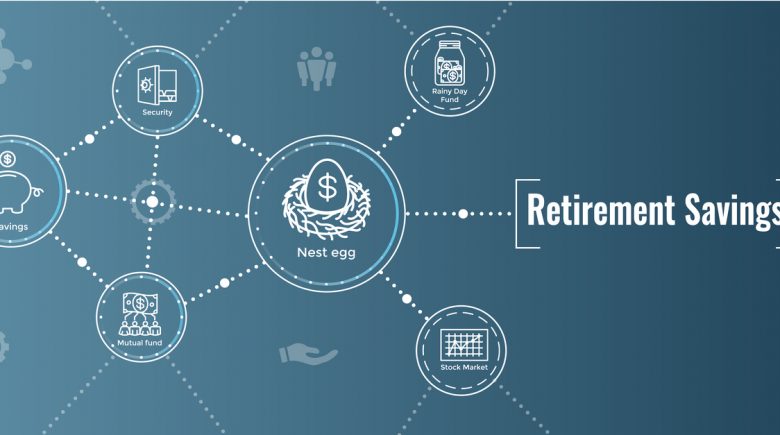If you are like a lot of people, and young, you are living paycheck to paycheck or haven’t yet thought about saving for retirement. Maybe you make just enough to get by that retirement plan seems like a pipe dream. Maybe you have some money set aside in the emergency fund but don’t plan to invest for the retirement.
And one fine day you realize that other people of your age are planning for their retirement. So you set aside $2000 per year and you are only 25 years old. Guess what? For the next 30 years and with an average 7 percent a year interest, that amount will grow to $425,000. That’s right, you will have a reasonable amount of savings by the age you hit 65. However, if you want to wait it out and start saving at 35 instead of 25, you will end up with half that amount.
The moral of the above story is that if you don’t start saving for your retirement right away, no matter what year you were born, you will miss out on perhaps the best and safest investment opportunity on the planet. With retirement plans, there are plenty of options to choose from and each one of them offer terrific tax advantages to grow your money along the way. To maximize this savings, however, you need to get started as soon as possible.
But listen. There is one more reason to save for the retirement right away. With medical advancements, people are living longer. Unless you are a drug addict or suffering from a serious health condition, you can expect to live beyond the age of 85. This means a retirement account will offer a safety cushion when you are old. With the Congress threatening to not overhaul by 2034 and money depleting in the social security fund, you may need other sources of income than the one offered by government. And because employer paid pension plans are no longer in picture, having your own retirement savings account is a must.
That being said, where do your start? There are two major options for you – 401Ks and IRAs. 401Ks are retirement savings plan made available to employees by employers – big or small. They are also offered to employees of charitable and public organizations. IRAs on the other hand are available to working people especially those who are self-employed. There is not much difference between these two plans except for contribution limits and eligibility. The main principle behind these plans is to not pay any tax to Uncle Sam while earning interest and dividends through investments at the same time. This may sound like a great deal. After all, who would not like a tax break like this? Additionally, not having to pay tax for capital gain and seeing the interest compounding are an added bonus. Well, not so fast!. When you opt to withdraw, you are required to pay tax on the amount.
401Ks
401Ks are mostly straightforward. You invest a certain amount towards retirement account and up to a limit for the year. Your employer will narrow down the investment options for you or you can choose to not grow the money at all. Most people choose three or four investment choices which are some actively managed stocks, mutual funds and ETFs. Others choose to have the money in a fixed deposit such as CDs and bonds. Most major companies match 401K contributions. If you aren’t aware how much you and your employer contribute each year, find out the number from your pay-stub. And if you are your own boss, you may already know how much to contribute on the behalf of employer and employee.
IRAs
IRAs as mentioned above are slightly different than 401Ks in the sense there are more investment options here. But there is always confusion about where to open an IRA. We suggest going with a low-cost mutual fund company. There is however a limit to how much you can investment in a year and that amount is small compared to 401Ks. With IRAs, just like 401Ks, you have choice about where you want to put money in. Traditional IRA and Roth IRA are two ways you are allowed to contribute. Which one is more suitable than the other depends on many factors such as marital status, affordability, basic eligibility and so on.
There are drawbacks in both these retirement plans. For example, your contribution is locked away for years or until you turn 60. If you plan to withdraw money from the account before that age, you will be subject to a big penalty. On the contrary, give it time and your money will grow seriously, enough to outpace inflation.
Even though saving for retirement is a good idea and a good start in preparation for the golden years, it may or may not make you rich or beat inflation. This doesn’t mean you should stop saving and start spending instead. You will still come out way ahead with an adequate savings plan. When you are allowing the money to grow for decades and with the right investment strategy, the end result can be amazing.
There are certain precautions to take when you are investing in one of these retirement plans. For example, you may want to make sure that your retirement broker company is legitimate. Money market funds are likely to be at the lowest-risk spectrum, so be aware of your investment risk level as well. And no matter where you are at, resist the temptation of withdrawing fund from your account. Many people tend to use retirement savings as their emergency fund or for purchasing real estate. With a traditional 401K plan, you may have to pay the entire tax plus an additional 10 percent penalty if the fund is taken out before the due date. It is also important that you consolidate all your retirement savings into one account, maybe rollover the previous contribution to new employer’s 401K when you change jobs.
If you are like a lot of people, and young, you are living paycheck to paycheck or haven’t yet thought about saving for retirement. Maybe you make just enough to get by that retirement plan seems like a pipe dream. Maybe you have some money set aside in the emergency fund but don’t plan to invest for the retirement.
And one fine day you realize that other people of your age are planning for their retirement. So you set aside $2000 per year and you are only 25 years old. Guess what? For the next 30 years and with an average 7 percent a year interest, that amount will grow to $425,000. That’s right, you will have a reasonable amount of savings by the age you hit 65. However, if you want to wait it out and start saving at 35 instead of 25, you will end up with half that amount.
The moral of the above story is that if you don’t start saving for your retirement right away, no matter what year you were born, you will miss out on perhaps the best and safest investment opportunity on the planet. With retirement plans, there are plenty of options to choose from and each one of them offer terrific tax advantages to grow your money along the way. To maximize this savings, however, you need to get started as soon as possible.
But listen. There is one more reason to save for the retirement right away. With medical advancements, people are living longer. Unless you are a drug addict or suffering from a serious health condition, you can expect to live beyond the age of 85. This means a retirement account will offer a safety cushion when you are old. With the Congress threatening to not overhaul by 2034 and money depleting in the social security fund, you may need other sources of income than the one offered by government. And because employer paid pension plans are no longer in picture, having your own retirement savings account is a must.
That being said, where do your start? There are two major options for you – 401Ks and IRAs. 401Ks are retirement savings plan made available to employees by employers – big or small. They are also offered to employees of charitable and public organizations. IRAs on the other hand are available to working people especially those who are self-employed. There is not much difference between these two plans except for contribution limits and eligibility. The main principle behind these plans is to not pay any tax to Uncle Sam while earning interest and dividends through investments at the same time. This may sound like a great deal. After all, who would not like a tax break like this? Additionally, not having to pay tax for capital gain and seeing the interest compounding are an added bonus. Well, not so fast!. When you opt to withdraw, you are required to pay tax on the amount.
401Ks
401Ks are mostly straightforward. You invest a certain amount towards retirement account and up to a limit for the year. Your employer will narrow down the investment options for you or you can choose to not grow the money at all. Most people choose three or four investment choices which are some actively managed stocks, mutual funds and ETFs. Others choose to have the money in a fixed deposit such as CDs and bonds. Most major companies match 401K contributions. If you aren’t aware how much you and your employer contribute each year, find out the number from your pay-stub. And if you are your own boss, you may already know how much to contribute on the behalf of employer and employee.
IRAs
IRAs as mentioned above are slightly different than 401Ks in the sense there are more investment options here. But there is always confusion about where to open an IRA. We suggest going with a low-cost mutual fund company. There is however a limit to how much you can investment in a year and that amount is small compared to 401Ks. With IRAs, just like 401Ks, you have choice about where you want to put money in. Traditional IRA and Roth IRA are two ways you are allowed to contribute. Which one is more suitable than the other depends on many factors such as marital status, affordability, basic eligibility and so on.
There are drawbacks in both these retirement plans. For example, your contribution is locked away for years or until you turn 60. If you plan to withdraw money from the account before that age, you will be subject to a big penalty. On the contrary, give it time and your money will grow seriously, enough to outpace inflation.
Even though saving for retirement is a good idea and a good start in preparation for the golden years, it may or may not make you rich or beat inflation. This doesn’t mean you should stop saving and start spending instead. You will still come out way ahead with an adequate savings plan. When you are allowing the money to grow for decades and with the right investment strategy, the end result can be amazing.
There are certain precautions to take when you are investing in one of these retirement plans. For example, you may want to make sure that your retirement broker company is legitimate. Money market funds are likely to be at the lowest-risk spectrum, so be aware of your investment risk level as well. And no matter where you are at, resist the temptation of withdrawing fund from your account. Many people tend to use retirement savings as their emergency fund or for purchasing real estate. With a traditional 401K plan, you may have to pay the entire tax plus an additional 10 percent penalty if the fund is taken out before the due date. It is also important that you consolidate all your retirement savings into one account, maybe rollover the previous contribution to new employer’s 401K when you change jobs.



